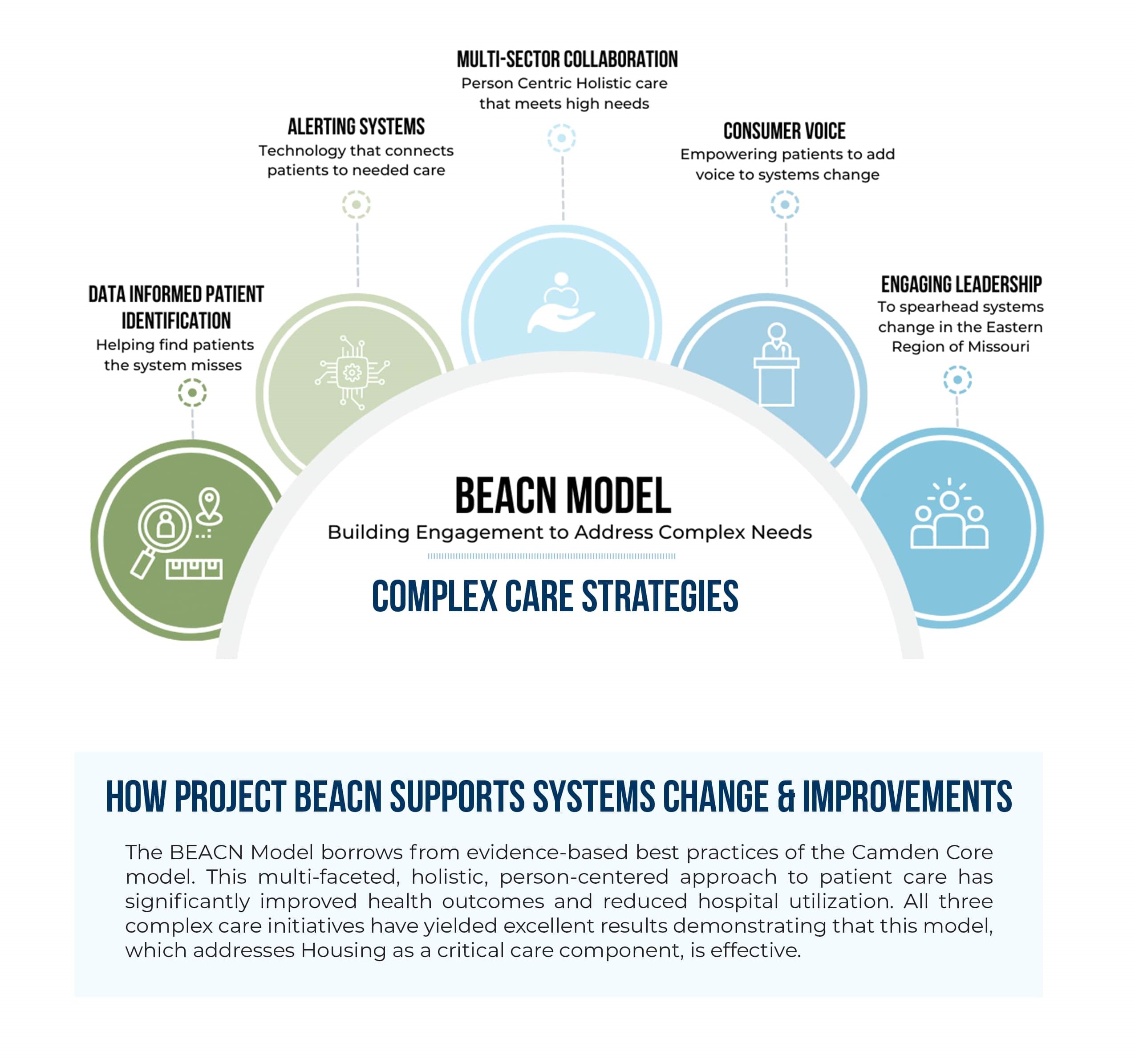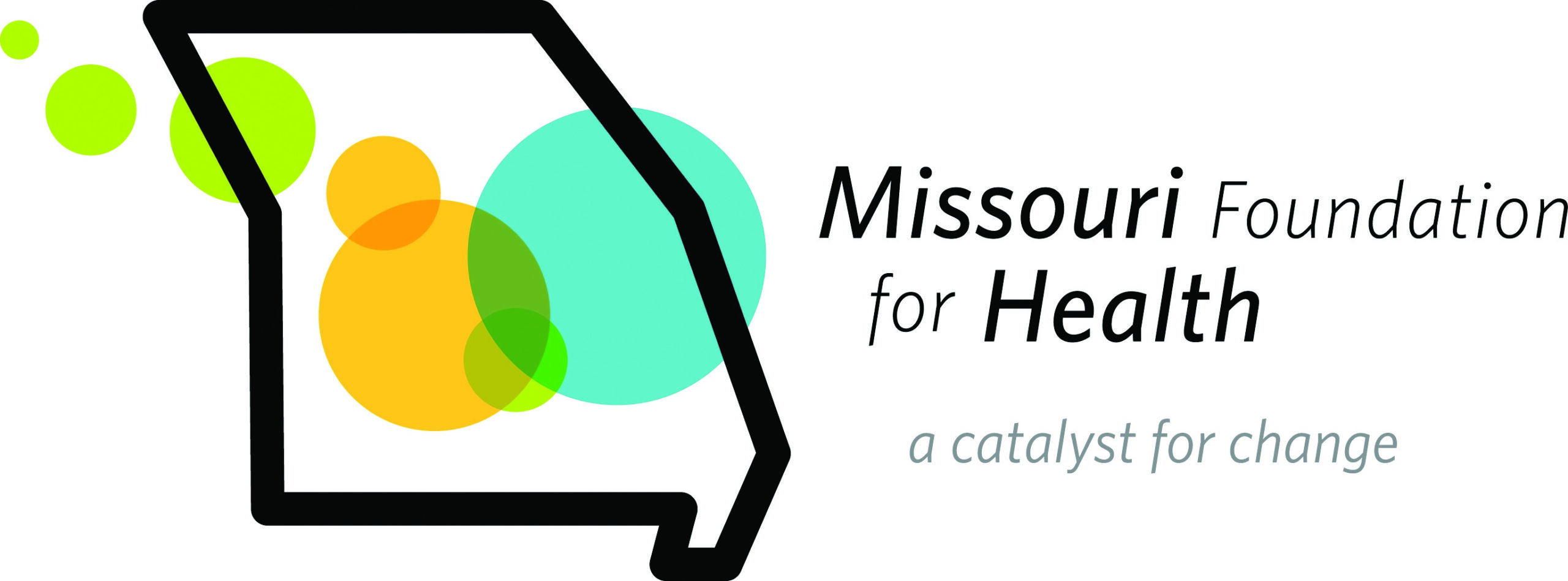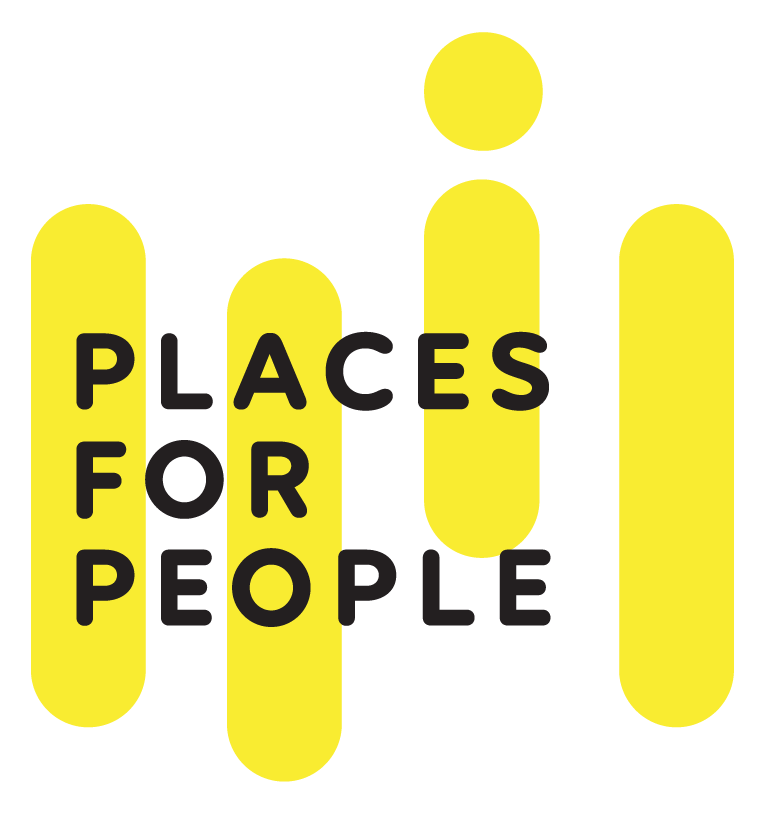Strengthening Ecosystems of Care and Addressing Complex Needs
Our complex care programs aim to improve behavioral healthcare delivery for individuals who are super-utilizers of the Emergency Departments (EDs) in Eastern Missouri. These patients are likely to:
Have serious mental health and physical health issues
Be homeless or without stable housing
Be uninsured
Need a range of additional services to address financial, employment and transportation barriers
Our Programs
BEACN
Building Engagement to
Address Complex Needs
Systems ABC
Systems Change for Aging and Behavioral Health Care
MO TAYLER
Missouri Transition Aged Youth Local Engagement and Recovery
Maternal Health Access Project
Building Engagement to Address Complex Needs (BEACN)
Building Engagement to Address Complex Needs is an innovative care model that is changing the way the system delivers care to complex patients. This is a targeted multipronged approach that includes important partnerships with the 3 main hospital systems and multiple collaborations with Community Mental Health Centers in Eastern MO. Implementation of the prescribed model has shown a significant reduction in ED utilization and demonstrated long-term positive health outcomes among enrolled patients; these efforts are coordinated with BHN’s Adult Emergency Room Enhancement Program (ERE). BEACN utilizes innovative funding strategies to support patients being cared for in the community.

Program Overview
Project BEACN (systems change)
BEACN is spearheading structural change in BH delivery for complex patients in Eastern MO using a model that incorporates:
-
Regional Data Sharing
-
Establishing Alerting systems connecting patients to needed care
-
Multi-sector Collaborations- Regional case staffing
-
Incorporating patient voice
-
Engaging Regional Leadership
-
Evolving the Regional response to complex patients Data from this project is closely analyzed to determine the impact on patient outcomes and hospital costs
Clinical BEACN (clinical care)
Clinical BEACN provides a “care transition team” to complex care patients through a subcontract with Places for People.
These patients receive case management services, flexible funds to meet short-term needs, and housing support for up to 12 months.
Treatment stipends are provided to the provider agency for up to six months while applications are made for Medicaid or other payor sources.
Data from this project is closely analyzed to determine the impact on patient outcomes and hospital costs.
Anita Udaiyar
Director of Community Programs
Places for People
Places for People is a key partner in addressing complex needs within the populations of focus served by both the BEACN and Aging/BH programs. Their staff delivers clinical services and housing supports and serves more than 2,300 people annually, offering an individualized approach to health and healing. In July 2017, Places for People became a Certified Community Behavioral Health Organization. PFP was the only one in St. Louis City or County at the time. CCBHO is a federal designation. CCBHOs focus on improving access to behavioral health care, crisis response, and providing effective treatment approaches across the lifespan.
Systems Change for Aging and Behavioral Health Care (System ABC)
This initiative works to reduce fragmentation, fill service gaps, and facilitate integration between aging and behavioral health (BH) agencies to foster a system of community care that positively impacts health outcomes for older adults.
Program Overview:
Target Intervention Group
The target intervention group is St. Louis City/County aging and BH community-based service agencies, who serve as the safety net for adults 60+.
Target Impact
Through agencies’ systems change efforts, we target impact for clients with BH needs who are underserved, high-risk, un/under-insured, low-income, and Black, Indigenous, and People of Color (BIPOC).
Britney Parson
Program Manager
Missouri Transition Aged Youth Local Engagement and Recovery (MO TAYLER)
This initiative is a 5-year SAMHSA-funded collaborative initiative of Missouri Department of Mental Health (DMH), with six funded entities in the eastern region: BHN, as co-project management with DMH; three DMH-contracted providers for service delivery (BJC, Behavioral Health, Compass Health Network, and Places for People); Behavioral Health Response for community trainings; and Missouri Institute for Mental Health (MIMH) for evaluation.
Missouri Transition Aged Youth Local Engagement and Recovery (MO TAYLER) is funded through Missouri Department of Mental Health (DMH).
Program Overview:
Missouri is among a cohort of national grantees of the Healthy Transitions Initiative, whose purpose is to expand access to developmentally appropriate, culturally and linguistically responsive services and supports for youth and young adults of transition age (16-25) who have, or are at risk for developing, serious mental health challenges.
Long-term Goal: In addition to project management, BHN also leads efforts to enhance the statewide infrastructure of resources for emerging adults, their caregivers, and the professionals who serve them.
Nicole Wood
Senior Program Manager
Maternal Health Access Project
Program Overview:
Increase universal screening for maternal depression and related behavioral health disorders including but not limited to depression, anxiety, and substance use disorder.
Increase timely detection, assessment, treatment, and referral for pregnant and postpartum person’s behavioral health disorders using evidence-based practices.
Nicole Wood
Senior Program Manager

University of Missouri School of Medicine
Started in 2018, the School of Medicine’s Missouri Child Psychiatry Access Project, or Maternal Health Access Project, has delivered more than 2,000 child psychiatry consultations to providers throughout the state. Now, the same team from MU is expanding their offerings to include mental health care for pregnant and new moms. The Maternal Health Access Project will build on the success of MO-CPAP in delivering access to mental health care in traditionally underserved communities.





